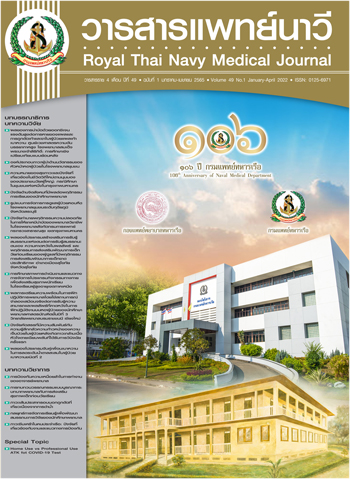Meaning of Well-being and Related Factors in New Normal as viewed by Adult Population: A Case Study of a Community in Bangkok
Main Article Content
Abstract
This qualitative research aimed to investigate the definition of “well-being” and related factors in new normal in accordance with the view of adult population. The selected participants in a focus group, living in an urban community in Bangkok, were interviewed under COVID-19 prevention protocol. A personnel data questionnaire and semi-structured interview with content validity index 1 were used for collecting data. Analyzed personal data using statistics, percentage, mean, standard deviation while content analysis was used for the qualitative data. The result revealed that the meaning of "well-being" in the new normal is "having a happy balance of life", and the factors associated with well-being are self-discipline, adapting and learning new things, recognized by families and community safety. Finally, this study supports that the meaning of well-being and related factors from the views of adult population should be used as basic knowledge to develop activities for well-being promotion in new normal era.
Article Details

This work is licensed under a Creative Commons Attribution-NonCommercial-NoDerivatives 4.0 International License.
References
World Health Organization. Who we are: constitution. [Internet]. [cited 2020 March 1]. Available from: https://www.who.int/about/who-we-are/constitution.
Campbell M, Gavett G. What Covid-19 has done to our well-being, in 12 charts. [cited 2021 May 22]. Available from: https://www.inspired-engagement.com/wp-content/uploads/What-Covid-19-Has-Done-to-Our-Well-Being-in-12-Charts.pdf.
Hartweg DL. Dorothea Orem’s self-care deficit nursing Theory. In: Smith MC, Parker ME. Nursing theories and nursing practice. [Internet]. 4th ed. Philadelphia: F.A. Davis Company; 2020. p. 105-32. [cited 2021 May 22]. Available from: https://search.credoreference.com/content/entry/fadaviswckz/dorothea_orem_s_self_care_deficit_nursing_theory/0.
Ochola EA, Karanja D, Elliott SJ. The impact of Neglected Tropical Diseases (NTDs) on health and wellbeing in Sub-Saharan Africa (SSA): a case study of Kenya. PLOS Neglected Tropical Diseases. [Internet]. [cited 2021 May 22]. Available from: https://doi.org/10.1371/journal.pntd.0009131.
Maragakis LL. The new normal and Coronavirus. [Internet]. [cited 2021 May 22]. Available from: https://www.hopkinsmedicine.org/health/conditions-and-diseases/coronavirus/coronavirus-new-normal.
Thai Health Promotion Foundation. Direction, goals and strategy 10-year period (2012-2021). [Internet]. [cited 2020 February 4]. Available from: http://resource.thaihealth.or.th/library/academic/13320. (in Thai).
Vijitsunthornkul K, Khumpai D, Charoendee K. Risk factors and risk behavior trends 2005-2015 survey of risk behavior to non-communication diseases and Injury: BRFSS. [Internet]. [cited 2020 February 4]. Available from: http://www.thaincd.com/document/file/info/brfss. (in Thai).
Beck A, Wustenberg T, Genauck A, Wrase J, Schlagenhauf F, Smolka MN, et al. Effect of brain structure, brain function, and brain connectivity on relapse in alcohol-dependent patients. Archives of General Psychiatry 2012;69(8):842-52.
Hfocus News Agency. Encourage Thais to reduce their behaviors to reduce the risk of premature death. [Internet]. [cited 2020 February 4]. Available from: https://www.hfocus.org/content/2019/02/16864. (in Thai).
Division of Non Communicable Diseases. Premature mortality data 5 NCDs death data. [Internet]. [cited 2021 April 4]. Available from: Index of /document/file/info/brfss (thaincd.com). (in Thai).
Srichan C. Take care of the mind during COVID-19: a positive reflection on a new normal life. [Internet]. [cited 2021 April 3]. Available from: wellness.chula.ac.th/?q=node/325. (in Thai).
Wongkampun S, Thiengtham V, Suwanumphai P. Socio-economic factors that affect the successful aging of the health of the elderly in the community, Bangkok. Journal of Public Health Nursing 2017;31(3):19-36. (in Thai).
Scott D, Happell B. The high prevalence of poor physical health and unhealthy lifestyle behaviors in individuals with severe mental illness. Mental Health Nursing 2011;32:589-97.
Andrew HM, Landon S, Elaine MH, Judy LS, Lindon JE. The relationship between education and mental health: new evidence from a discordant twin study. Social Forces 2016;95(1):107-31.
Larping U. A study of how to apply objects of sympathy to develop the elderly's social health in northern Thailand. Dhammatha Academic Journal 2018;18(2):233-43. (in Thai).
Phra Paisarn Visallo. True happiness with wisdom: the way to intellectual well-being. 3rd ed. Bangkok: Buddhist Network Press; 2010. (in Thai).
Dur K, Srivastava RK. A gender-based study on the impact of psychological wellbeing on academic performance of students. The IUP Journal of Organizational Behavior 2020;19(4):40-65.
Christopher F, Nuqui AV. Emergence of a situational leadership during COVID-19 pandemic called new normal leadership. IJAMR 2020;4(10):15-9.
Office of National Statistics. Population size and structure by age and gender and province 2019. [Internet]. [cited 2021 April 4]. Available from: http://statbbi.nso.go.th/staticreport/page/sector/th/01.aspx. (in Thai).
Ritchie J, Lewis J, Nicholls CM, Ormston R, editors. Qualitative research practice: a guide for social science students and researchers. Thousand Oaks, CA: Sage Publications; 2013.
Krippendorff K. Content analysis; an introduction to its methodology. Beverly Hills, CA: Sage Publications; 1980.
Govindasamy D, Ferrari G, Maruping K, Bodzo P, Mathews C, Seeley J. A qualitative enquiry into the meaning and experiences of wellbeing among young people living with and without HIV in KwaZulu-Natal, South Africa. Social Science & Medicine 2020; 258. [Internet]. [cited 2021 April 4 ]. Available from: https://www.sciencedirect.com/science/article/pii/S0277953620303221.
Cheng C, Wang H, Ebrahimi OV. Adjustment to a “new normal:” coping flexibility and mental health issues during the COVID-19 pandemic. Front Psychiatry 2021;12:626197.
Flimthailand. Adult development. [Internet]. [cited 2021 April 4]. Available from: https://flimthailand.wordpress.com/2015/05/26/พัฒนาการของวัยผู้ใหญ่/. (in Thai).
Espinosa PR, Chen Y, Sun C, You S, Lin J, Chen K, et al. Exploring health and well-being in Taiwan: what we can learn from individuals’narratives. BMC Public Health 2020;20(1):159. doi: 10.1186/s12889-020-8201-3.
Techsauce Team. 7 factors that will shape new normal. [Internet]. [cited 2021 May 22]. Available from: https://techsauce.co/news/7-factors-that-will-shape-new-normal. (in Thai).
Lekwong S, Lawang W, Rattanakrethakul S. Factors affecting the spiritual well-being among family caregivers of persons with physical disability. Journal of Phrapokklao Nursing College 2019;30(1):102-12. (in Thai).
Weeranakin P, Promphakping B. Local meanings of wellbeing and the construction of wellbeing Indicators. Soc Indic Res 2018;138:689-703.
Prakash IJ, Reddy MY, Menon G. Covid-19 and the ‘new normal’: a gerontological perspective. Indian Journal of Gerontology 2021;35(2):283-98.
Lanham NS, Bockelman KJ, Brendan J. Telemedicine and orthopaedic surgery the COVID-19 pandemic and our new normal. JBJS Rev 2020;8(7):e2000083. doi: 10.2106/JBJS.RVW.20.00083.


